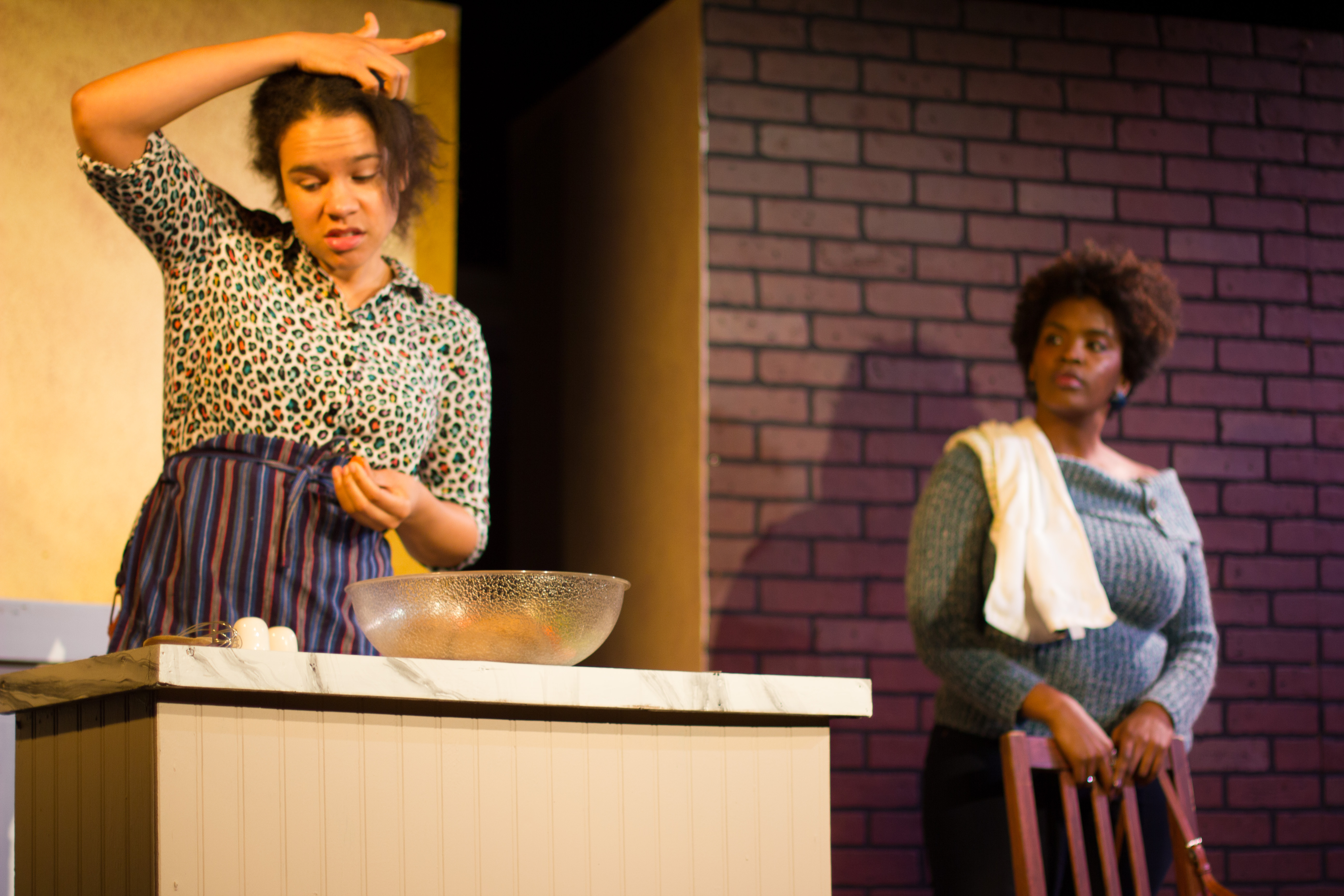Black Like Us
Annex Theatre, 1100 E. Pike St., 728-0933, annextheatre.org. $5–$20. 8 p.m. Thurs.–Sat. Ends March 1.
Did you know Dick Cheney and George W. Bush are both distantly related to Barack Obama? Fact.
But just as more than bloodlines are needed to forge kinship, it takes more than being raised under the same roof to keep a family together. Local playwright Rachel Atkins’ new drama posits that for blacks who could “pass” for white, embracing one’s black heritage once hinged on whether you might get a better offer elsewhere.
It’s a fascinating theme. In post–Civil War New Orleans, for example, the occupying U.S. Army commander issued a Reconstruction edict that brutally simplified racial categories: If you weren’t 100 percent white, you were black. Overnight, musicians of color who had played in opera houses and elite salons were tossed into the street to compete with self-taught musicians for tips and gigs. That law lit the fuse that helped create jazz.
In 1958 Seattle, where Black Like Us is set, color lines are subtler, yet still insidious, for sisters Florence (Chelsea Binta) and Maxine (Dior Davenport). Maxine is a budding civil-rights activist, but Florence has found a quicker way into the broad sunlight of zero discrimination. Because she can pass, she was mistakenly hired to work at the local department store, where she’s met a fine Italian-American gent who wants to marry her. Oh, and he has no idea she’s black.
Although we never meet the beau or the sisters’ parents, we do encounter both girls’ granddaughters several decades later. Florence’s grandkids range from the hesitant Amy (McKenna Turner) to the more contemplative Michelle (Lindsay Evans) and the bull-in-a-china-shop Sandra (Alyson Scadron Branner), who sets up a meeting with Maxine’s descendants at the “neutral ground” of a Bellevue Starbucks.
Director Jose Amador has his hands full keeping Atkins’ often unwieldy go-cart of a play in steady forward motion. She favors raw emotion over finesse (here the phrase “keeping it real” comes to mind), when a more practiced playwright might accomplish both. When Maxine’s side of the family, Tanya (Marquicia Dominguez) and Denise (Kia Pierce), reluctantly arrives, it’s explosive, awkward, and funnily, scarily credible. That Atkins then takes another long, wistful look back to 1958 makes a nice bookend, but completely deflates the drama—adding an unnecessary 45 minutes following the denouement.
A word about the stagecraft: Plaudits to John Clarke, whose interlocking stage design makes a Rubik’s Cube look elementary. Likewise, Shane Regan’s sound design is a crazy quilt of terrific soul classics, from Gil Scott-Heron’s proto-rap classic “The Revolution Will Not Be Televised” to Sly and the Family Stone’s “Family Affair” to William DeVaughn’s “Be Thankful for What Youve Got.” That Florence’s very white grandaughter Sandra has James Brown’s “Say It Loud—I’m Black and I’m Proud” as her cell ringtone: Priceless. Kevin Phinney
Mr. Pim Passes By
Taproot Theatre, 204 N. 85th St., 781-9705, taproottheatre.org. $20–$40. 7:30 p.m. Wed.–Thurs., 8 p.m. Fri., 2 & 8 p.m. Sat. Ends March 1.
In early adulthood I acquired an affinity for Winnie-the-Pooh. A.A. Milne’s ability to amuse grownups and children astounded me. As such, Taproot’s production of Mr. Pim Passes By proves Milne’s power to charm in others genres.
In this 1919 drawing-room comedy, Dinah (Allie Pratt) wants to marry Brian (Daniel Stoltenberg) but cannot without the approval of her uncle and guardian, George (Ryan Childers), though they have the approval of her aunt Olivia (April Poland). This is complicated further when befuddled Mr. Pim (Chris Ensweiler) enters, creating confusion and mayhem with his questions about true love. All this happens under the critical eye of Lady Marden (Kim Morris).
These stock characters do teeter on the brink of absurd typicality; fortunately, the cast finds the balance to make them completely believable. As the ingenue, Pratt brings just enough flair for annoying teenage self-expression to avoid caricature. While Olivia could descend into conniving and emasculation (a perforated line is all that separates her from shrewishness), Poland adds love and playfulness to the part. As enchanting as the Hundred-Acre Wood, Mr. Pim (and its performances) trump the distracting direction and design.
Except for Roberta Russell’s subtle lighting, this production is a visual eyesore, Spirograph meets Etch-a-Sketch. In his angular set design, Mark Lund places portraits above the room’s French doors. Have you ever gone to someone’s home and seen large artworks hung that high? (Adding further distraction, when characters here allude to their dead kin, they point—and strain their necks—to their lofty ancestors.) Sarah Burch Gordon’s costumes—with stripes, prints, and argyles galore—deliver more shapes, colors, and patterns than a Kandinsky painting. Director Karen Lund’s awkward single-plane blocking forces much unmotivated movement; it’s like watching my cat and dog play—a mishmash of motion with no reason behind it.
Now I need to go appreciate my artworks at home, hung at eye-level as God intended. Alyssa Dyksterhouse
Spamalot
5th Avenue Theatre, 1308 Fifth Ave., 625-1900, 5thavenue.org. $39 and up. 8 p.m. TueS.–Sun. (Plus Matinees). Ends March 2.
There are two kinds of people, I think, who may not be enthralled by 2005’s Spamalot: those who don’t care for the source movie (Monty Python and the Holy Grail, for anyone who’s been lost in the jungles of Borneo for the past decade), and those who adore it. The verbatim lifts from the film are hilarious; the heaps of surrounding material are tirelessly razzmatazzy but scattershot. (The “Knights of the Round Table” number, to name just one example, loses more than it gains from being expanded from the perfect, immortal 90 seconds of the film into a full-dress Vegas sendup.) The show’s problems, minor but nagging, are the usual screen-to-stage conversion issues (cf. Young Frankenstein): Jokes that work when underplayed onscreen don’t necessarily when overplayed (as they must be, to be audible) onstage; and one-liners can’t always sustain entire production numbers.
You sure can’t fault the creators for generosity, though. Ex-Python Eric Idle (present at Thursday’s opening night, which was a giddy thrill) and his musical collaborator, John du Prez, throw everything at the audience that musical comedy has to throw. And the director of the 5th Avenue’s production, Josh Rhodes, gilds the lily with a half-dozen Super Bowl references— Pavlov rings his bell, and we salivate on cue.
Most remarkable among a cast that is just about the best local musical theater has to offer are Laura Griffith as the Lady of the Lake, who gets to show off an immense range, both vocally and comedically, and Dane Stokinger, an absolutely protean performer who disappears into each of a sizable list of character parts (from The French Taunter to Tim the Enchanter). I had to keep checking the program every time he turned up in a new guise, incredulous it was really him. Gavin Borchert
E
stage@seattleweekly.com





